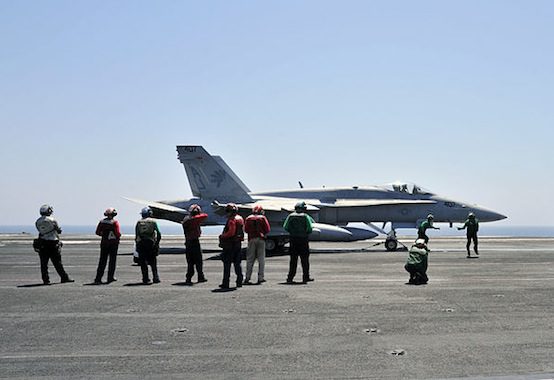The Illegal War on ISIS After One Year

The war on ISIS is now over a year old, and it is still being waged illegally. Don’t expect Congress to do anything to correct that:
Sen. Bob Corker (R-Tenn.), chairman of the Foreign Relations Committee, said that because many lawmakers believe Obama can use the 2001 AUMF to go after the Islamic State, they don’t feel as urgently as Kaine about the issue. Corker acknowledged, however, that a lot of lawmakers also think the president is stretching the limits of the 14-year-old AUMF, which was passed after the Sept. 11 attacks to authorize military action against al Qaeda. Obama has argued that the Islamic State is an offshoot of al Qaeda and is therefore covered by the old authorization.
“People believe that while it’s way out on the outer edges, there is a legal basis for what is happening,” Corker told The Huffington Post last week. “But I know that it’s something that people get a bee in their bonnet about.”
Another reason that many members of Congress feel no urgency to debate and vote on a new resolution is that they know it will have no effect on the conduct of the war. Obama said early on that he believed he was already authorized to start the war last year, and he also made clear that the war was going to continue regardless of what Congress did or didn’t do. If Congress passes a new AUMF for this war, the war will continue, and if it fails to pass one the war will continue. There is no danger that Congress would pass a resolution calling for the war to end, and it is even less likely that Congress would stop funding it. Unless Congress were prepared to halt funding for the war (which Congress is never willing to do), there is nothing to do stop him continuing the war to the end of his term, and there will be nothing to stop his successor from continuing it indefinitely. Voting on a new authorization at this very late stage would just be an affirmation by Congress of what Obama has been doing.
One flaw in calling for a new AUMF for this war is that there isn’t going to be a substantive debate about the wisdom of the policy under consideration. Advocates of debating and voting on a new authorization may want a more limited war than other members, but there doesn’t seem to be much disagreement about whether the war ought to be continued, and there has never been any meaningful debate about whether it should have been started in the first place. Debating a new authorization isn’t going to provide this, and so it would just serve as an opportunity for members to endorse the campaign without offering much in the way of the oversight or scrutiny that Congress ought to be providing.
Contrary to what I expected last year, the public has remained broadly supportive of the campaign despite the fact that most Americans don’t think the war is going all that well. The negligible costs of the war for the U.S. allow it to continue without much measurable success, and there are no American casualties to sour the public on the war. The public’s view of the threat from ISIS is absurdly exaggerated, and so support remains remarkably high after twelve months of mostly desultory bombing. Opposition to sending ground troops into combat against ISIS is still greater than support for doing this, but it has been waning over time:

There is still significant resistance to a new ground war, but there also appears to be considerable tolerance for an open-ended air campaign. As long as that is what the war on ISIS continues to be, the public will apparently approve of it with the knowledge that it isn’t having much of an effect.